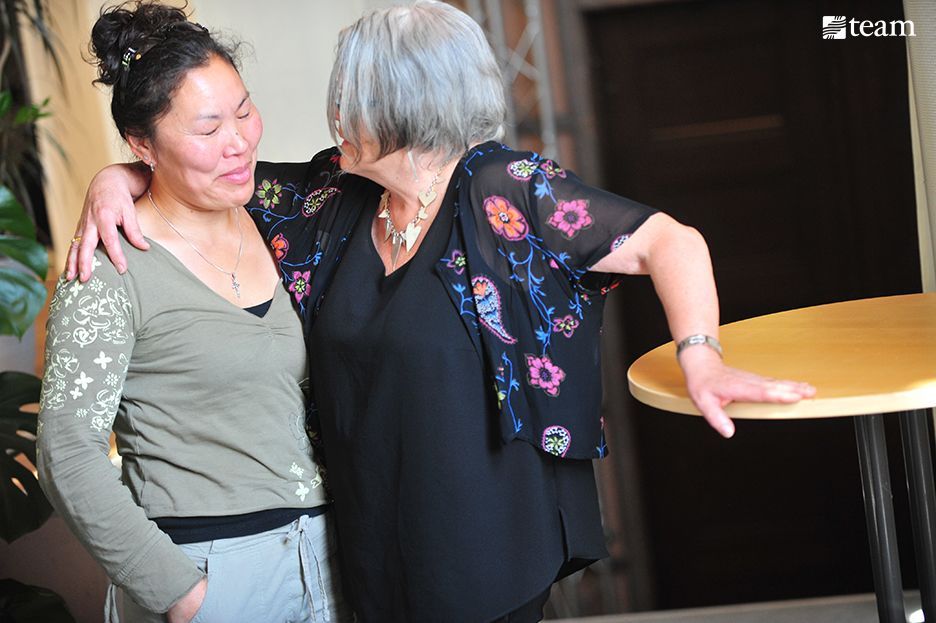For over 130 years , TEAM’s passion and priority have been to partner with the Church as it equips and sends individuals to share the Gospel of Christ with unreached and underserved nations.
In today’s globalized context, TEAM’s focus remains the same. Yet, it is pivoting toward more of a supporting role of serving and assisting the global Church as it fulfills God’s call to make disciples among the nations. This shift is something God is doing. TEAM’s future fruitfulness depends on serving and following global leaders with whom we can link arms as we serve Christ together. It also explores new channels for “called” disciples to enter places closed to traditional missionaries.
For this month’s Prayer Focus, we invite you to pray for the global Church and the future of missions in these 5 areas:
1. Mobilization of the Global Church
Over the last decade, TEAM identified the need for significant adaptation to meet the needs of an increasingly globalized world. Advances in technology and digital communications allow new avenues for the dynamic growth and health of the global Church.
According to TEAM International Director Dave Hall, “TEAM will increasingly seek ways to serve and assist the global Church as it fulfills God’s call to make disciples among the nations. While we will not abandon our commitment to serving the Church in North America, the future of missions will be increasingly shaped by our global brothers and sisters outside North America. We want to link arms with global leaders to serve Christ together. Such endeavors promise significant Kingdom advances in some of the world’s neediest regions.”
PRAY for TEAM’s efforts to assist, equip and empower national believers to fulfill God’s call to reach the lost in their own communities and beyond.
2. Member Care Network
While our world is more connected than ever before, the challenges of cross-cultural ministry pressure new global workers in ways that threaten adjustment to their new home and ministry. Language learning, cultural adaptation, family adjustment, new health and safety routines, and relational bonding can be overwhelming. Veteran workers also encounter mid-career pressures when family and ministry dynamics change, co-workers leave, and spiritual, physical, or mental struggles surface.
TEAM’s Member Care Network consists of holistic caregivers who prayerfully foster the spiritual vitality of those committed to spiritual service, reminding them to work with God, empowered by the Spirit and not merely from human effort, for God. As TEAM comes alongside national sending movements worldwide, we want to train and equip indigenous workers to provide member care for those they send to bring the Gospel to neighboring countries and communities without Christ.
PRAY for the Member Care staff and the global workers they support, that these relationships may be encouraging, edifying and effective.

Member Care specialists help global workers face the spiritual challenges that come with missionary life.
3. Equipping of Missional Churches
As the primary focus of TEAM’s mission is to partner with the global Church to send disciples of Jesus Christ to actively disciple others as they incarnate Christ’s love to those they serve, the following step is to form communities of disciples to do the same. These expressions of Christ’s life are the Church, the living Body of Christ. The growth of the Church in the global south is evidence of God’s blessing and purpose to use this growth and maturity to take an active part in reaching the nations for Christ. Thus, our former North America sending priority is shifting towards resourcing and serving national churches to send and receive global workers (also called “ polycentric sending ”).
PRAY for God to raise up missional churches around the world to send and receive ambassadors of the Gospel.
4. Cybersecurity to Safeguard Ministry
Globalization provides exciting opportunities for mission agencies like TEAM. However, it also creates complex challenges and the imperative to keep pace with technology to serve and safeguard our cross-cultural workers. Today TEAM has nearly 20 closed-access ministry areas. These include countries, regions, or people groups where traditional ministry activity is restricted due to state policy, cultural hostility, or both. Christian workers share their faith in creative legal ways, but their presence represents a risk to their colleagues and national believers. TEAM provides tools and training to our global staff in high-risk areas.
PRAY for TEAM’s Global Security Task Force as they work tirelessly to implement and maintain security protocols.

Today’s technology provides new avenues for ministry, but cybersecurity is essential to keep global workers safe in online communications.
5. Learning and Development
TEAM’s Learning and Development Group (L&D) creates a culture of learning to equip personnel for effectiveness, fulfillment, and joyfulness in life and work as they carry out our mission and values. To do this, L&D collaborates with organization leaders and subject matter experts to create customizable learning pathways for individuals and teams.
Learning and Development focuses on three areas: People (helping personnel be effective and healthy through collaborative learning and mentoring), Mission (helping teams share organizational priorities and define values), and Transformation (ensuring that all learning experiences result in effective change).
PRAY for global workers and staff as they participate in various Learning and Development initiatives, all for the glory of God and further advancement of His kingdom.




















